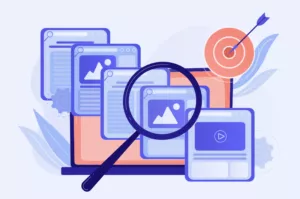Backlinks are one of the most significant ranking criteria in search engine optimization (SEO). Links pointing to your website from other websites are called backlinks, sometimes called inbound or incoming links. These connections serve as signals to search engines, telling them that your website is reliable, reputable, and relevant to the subject at hand.
Backlinks were important in the early days of the internet because they helped search engines like Google assess the value and relevancy of web pages. A website would rank higher in search engine results pages (SERPs) the more backlinks it had. But as time went on, search engines developed and started considering additional factors, like the quality of the backlinks, the importance of the website that provided the connection, and the link’s context.
Backlinks are still an essential part of SEO today, but their significance has evolved. Here’s a closer look at the backlinks’ function in current SEO:

Establishing Trust and Authority
An influential and reputable website that links to yours effectively approves the quality and credibility of the content you produce. These links are seen by search engines as endorsements, which might raise the ranks of your website. In your industry or niche, the more trustworthy and authoritative backlinks you have from other sites, the more probable it is that people would view you as trustworthy.
Enhancing Traffic and Visibility
In addition to increasing organic traffic, backlinks can help your website become more visible. A backlink from another website directs users to your website, which may result in an increase in traffic and interaction. Search engines may see this increased traffic as evidence of the value and relevancy of your website, which could raise its ranks even further.
Anchor Text and Relevance
Search engines can gain important context about the content of your website from the anchor text, which is the text that can be clicked on a backlink. It can support the relevancy of your pages for particular keywords or topics if the anchor text is relevant to the material on your website. Search engines may view excessive usage of exact-match keywords in anchor text as manipulative, therefore it’s important to utilize natural, varied anchor text and to find a balance.
Link Building and Outreach
To fully utilize the power of backlinks, outreach, and link-building initiatives must be taken. This entails actively looking for ways to obtain backlinks from reliable sources and creating content of a quality that people will want to link to. Guest posting, broken link building, creating links from resource pages, and interacting with thought leaders and industry influencers are a few popular link-building strategies.
Monitoring and Dennying Spammy Links
Even though backlinks are great for SEO, you should keep an eye on the quality of the links that are coming in. Too many spammy or low-quality backlinks can hurt a website’s score since search engines may interpret them as attempts to manipulate ranks. It’s advised to use Google’s Disavow Tool to remove any spammy or irrelevant backlinks pointing to your website to protect it from possible penalties.
Types of Backlinks
For search engines, not all backlinks are made equal. Backlinks come in various forms, each with a varied degree of importance and influence:
- Dofollow Backlinks: These are the common, crawlable links that provide the connected pages more link equity and search engine strength. For SEO purposes, they are the most valuable kind of backlinks.
- Nofollow Backlinks: Backlinks marked with the “nofollow” tag tell search engines not to share link equity or ranking power with these links. Even though nofollow links do not affect rankings directly, they can still be useful because they generate traffic through referrals and may eventually be changed to dofollow links.
- Sponsored Backlinks: Advertorials or sponsored content are common examples of sponsored backlinks. They are usually identified by a “sponsored” or “nofollow” attribute. Their commercial nature means that even while they can generate traffic, they have little SEO value.
- Self-Created Backlinks: These are links that you build yourself. You can do this by adding internal links from your own website or by using techniques like forum posting, blog commenting, and directory submission. Although self-generated backlinks have their uses, editorial backlinks from reliable, outside sources typically have a greater influence.
The Bottom Line
Although backlinks continue to be a significant ranking aspect, it’s important to remember that their function in SEO is always changing. The importance of prioritizing quality over quantity is growing as search engines focus on user experience and strive to develop their algorithms.
When deciding ranks, search engines like Google have started to give more weight to elements like user engagement metrics, overall website authority, and high-quality content. Although important as ever, backlinks are no longer the only factor that determines a website’s position in the search engine results pages.
You’ve arrived at the right place if you need assistance with SEO for your website. The greatest choice for SEO services in the Sunshine Coast is F8 Media. With the assistance of our committed team of experts, you can make the most of your online platforms and position yourself for long-term, sustainable success.



